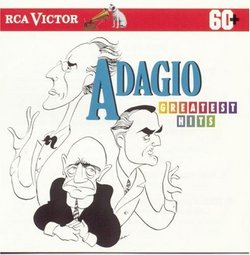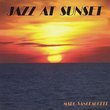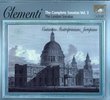| All Artists: Adagio Title: Adagio Greatest Hits Members Wishing: 0 Total Copies: 0 Label: RCA Release Date: 7/15/1997 Genre: Classical Styles: Opera & Classical Vocal, Forms & Genres, Concertos, Theatrical, Incidental & Program Music, Historical Periods, Baroque (c.1600-1750), Classical (c.1770-1830), Modern, 20th, & 21st Century, Instruments, Reeds & Winds, Symphonies Number of Discs: 1 SwapaCD Credits: 1 UPCs: 090266883226, 090266883226 |
Search - Adagio :: Adagio Greatest Hits
CD DetailsSimilar CDs |
CD ReviewsAdagio - Greatest Hits Brad Broseker | Gaithersburg, Maryland | 05/29/2000 (5 out of 5 stars) "This is a masterful compilation of some the most hauntingly beautiful music put to CD. Bravo!" Out on a limb richard mullany | waynesville, north carolina United States | 09/04/2001 (3 out of 5 stars) "I sat down to browze the B's and noticed the large number of these collections, all similarly titled; The Greatest of something or other. I must confess I feel sad to think that many people will listen to,for instance, the "adagietto" from Mahlers Fifth symphony entirely out of any context with the overwhelming music that precedes it. I guess it is okay to not know all of the work but if thats the case why bother with mere extracts?. Really, I'm not playing the snob here but think abbout it, who determines what the greatest is? I look through the titles on these collections and I can think of hundreds of titles that belong under the rubric of "Greatest". There would be a great deal of sense in getting a recording of the Mahler Fifth, or indeed any of his symphonies, listening to it carefully, reading the liner notes if there are any and talking to another music listener about it and do whatever you have to do to get a handle on this music. Believe me, this is tremendous music from start to finish and sadly, there are no shortcuts to understanding it. What must happen is for the mind to be opened up as an act of will, which is the least you can bring to the table. The composer sweats bullets, the orchestra members devote whole days to mastering one passage, an engineer knocks himself out and for what? For me to listen to a snippet or two while I defrost the freezer? And can I con myself into believing that I am now a big fan of Mahler based on an extract? I don't think so. I know, this sounds like arrant snobbery but it isn't. If anything this urge to taste but not to digest is itself a form of snobbery, it says,"I don't need to know all that other stuff to get something out of a piece of music". I think we do need to know a lot of stuff, most of all because it's fun and it's supremely rewarding too. To own a collection of the greatest music means about a thousand cd's or so, not five or six. I'm closing on two thousand and far from finished. I'm not bragging, but I think collections like this are trivial at best and I say that as an owner of some dating back to lp's. Sometimes I had to buy a whole set in order to get maybe one rarity. That hardly happens anymore. Go out on a limb and get a whole pie rather than one thin slice." Interesting collection, good price, but definitely not the g ronaldbrian | Quezon City, Philippines | 02/17/2006 (3 out of 5 stars) "In Iris Murdoch's The Nice and the Good, one of the characters "was always playing slow movements" on his gramophone. Murdoch gave him the most memorable line from the novel: "Happiness is a matter of one's most ordinary everyday mode of consciousness being busy and lively and unconcerned with self. To be damned is for one's ordinary everyday mode of consciousness to be unremitting agonizing preoccupation with self." (Willy Kost, ch. 22). It's impossible he said this with heavy metal music on the background. Was the thoughtful intermezzo from the Cavalleria Rusticana perhaps playing when he said this?
The slow movements in this compilation are interesting, but I wouldn't call them the greatest of adagios. Offhand, "the greatest" should include the adagio from Mozart's Piano Concerto No. 23 in A, the adagio sostenuto from Rachmaninoff's Piano Concerto No. 2 in C minor, the andante from Shostakovich's Piano Concerto No. 2 in F, the romance from Chopin's Piano Concerto No. 1 in E minor, or even the largo from Bach's Double Violin Concerto in D minor. These compositions are far grander than the clichéd Albinoni's Adagio included in this album (as in every other classical "greats" album). But that's just me. The strengths of this cd are the beautifully performed intermezzo from Mascagni's Cavalleria Rusticana, Elgar's Nimrod variations, and Brahm's Adagio from Violin Concerto in D. The Cavalleria Rusticana, in particular, is elegantly performed, in contrast to the melodrama and haphazard sentimentality which seems to be the tendency among a lot of conductors with this piece. " |





